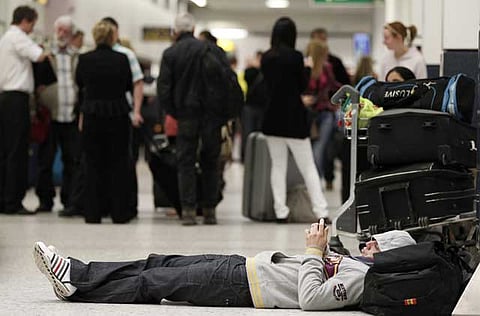North Europe now a 'no-fly' zone
Eruption from the Eyjafjallajokull glacier in Iceland leaves hundreds of passengers stranded

London: A huge cloud of ash from a volcano in Iceland turned the skies of northern Europe into a no-fly zone on Thursday, leaving hundreds of thousands of passengers stranded.
An eruption on Wednesday, the second in a month, from below the Eyjafjallajokull glacier hurled a plume of ash six to 11 kilometres (3.8 to 7 miles) into the atmosphere, and this spread south east overnight.
No flights are allowed in British air space, except in emergencies, from 1100 GMT until at least 1700 GMT as the ash spreads across the country, Britain's National Air Traffic Service (Nats) said.
A Nats spokeswoman said it was the first time "within living memory" that a natural disaster had caused Britain to halt flights into its airspace. British airspace was not even closed after the September 11, 2001, attacks on US cities, she said.
Airline staff at Stansted airport, north-east of London, told customers it could be closed until Sunday, said stranded passenger Andy Evans.
"People just don't know what to do," he said. "There are hundreds of people in the queues at the sales desks."
Last year, British airports handled around 6,000 flights a day, according to data from Britain's Civil Aviation Authority.
Volcanic ash contains tiny particles of glass and pulverised rock which can damage engines and airframes.
In 1982 a British Airways jumbo jet lost power in all its engines when it flew into an ash cloud over Indonesia, gliding inexorably towards the ground before it was able to restart its engines.
The incident prompted the aviation industry to rethink the way it prepared for ash clouds, resulting in international contingency plans activated yesterday.
Cancellations
Paris, Brussels, Amsterdam and Geneva airports said they had cancelled a large number of flights.
Airspace in northern Sweden was closed and transatlantic flights were taking a longer route south to avoid the cloud, a spokesman for Arlanda airport in Stockholm said.
Swedish airports authority Swedavia said it expected the cloud would eventually force the closure of the airport at Gothenburg on Sweden's west coast later in the day.
A spokeswoman for Scandinavian airline SAS (SAS.ST), the shares of which were down almost seven per cent, said the group expected to cancel hundreds of flights.
The eruption has grown more intense, University of Iceland volcanologist Armannn Hoskuldsson said.
To the east of the volcano, thousands of hectares of land were covered by a thick layer of ash, while a cloud was blotting out the sun in some areas along the southern coast of Iceland, local media reported.
All air traffic in and out of Norway's main Oslo Airport was cancelled while flights from Denmark's Copenhagen airport were also severely disrupted.
Finland's airport manager Finavia said northern Finland's air space would be closed until 1200 GMT on Friday, and Finnair (FIA1S.HE) said it had cancelled several domestic and international flights.
The Danish part of North Sea air space has been closed, Danish air traffic controller Navair said, with the entire Danish air space due to be closed by 1600 GMT.
A spokeswoman for the German air traffic body said there were no immediate plans to shut German airspace.
Eurostar, the rail company, said it had received a big boost due to the disruption to air travel, with hundreds of enquiries from stranded passengers trying to enter or leave Britain.


